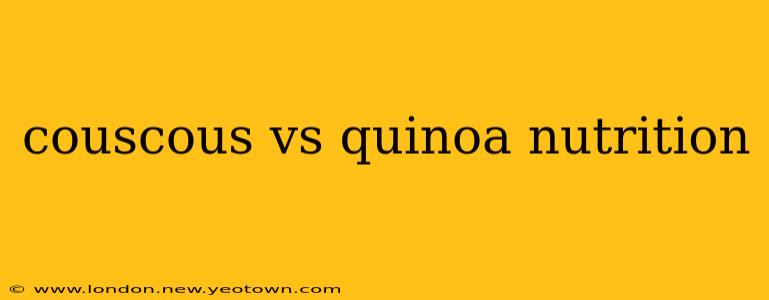Couscous vs. Quinoa: A Nutritional Showdown!
The grocery store aisle can feel like a battlefield sometimes, especially when faced with a choice between seemingly similar healthy foods. Couscous and quinoa, both staples in many healthy diets, often find themselves in this very predicament. But which one reigns supreme in the nutrition department? Let's delve into a delicious comparison, exploring the nutritional profiles of these grains and settling the couscous vs. quinoa debate once and for all.
Our story begins in the bustling marketplace, where a discerning shopper, let's call her Anya, finds herself torn between two enticing bags. One, a shimmering pearl of couscous, whispers promises of fluffy texture and quick cooking. The other, a mountain of quinoa, boasts of complete protein and earthy flavor. Anya's quest for the perfect grain is about to begin.
What is Couscous?
Couscous, often mistaken for a grain, is actually a pasta made from semolina, a coarse flour made from durum wheat. Its tiny, pearl-like shape and quick cooking time make it a popular choice for busy weeknights. While it’s not a whole grain in the strictest sense (unless you opt for whole wheat couscous), it offers a decent source of carbohydrates for energy.
What is Quinoa?
Quinoa, on the other hand isa complete protein source, meaning it contains all nine essential amino acids our bodies can't produce on their own. Originating in the Andes Mountains, this ancient grain is now a global health food darling, celebrated for its nutritional density and versatility. It's a complete protein, gluten-free, and rich in fiber, making it a powerhouse of nutrients.
Couscous vs. Quinoa: A Nutritional Face-Off
Let's break down the nutritional differences, focusing on key aspects:
1. Protein: Quinoa is the clear winner here. As a complete protein, it offers a more comprehensive amino acid profile than couscous, which is relatively lower in protein. This makes quinoa a more substantial choice for building and repairing tissues.
2. Fiber: Both couscous and quinoa offer fiber, but quinoa generally boasts a higher fiber content. Fiber is crucial for digestive health, promoting regularity and satiety. This helps you feel fuller for longer, aiding in weight management.
3. Carbohydrates: Both are carbohydrate sources, providing energy. However, the type of carbohydrate differs. Couscous, being made from wheat, has a higher glycemic index (GI) than quinoa, meaning it can cause a more rapid spike in blood sugar. Quinoa's lower GI makes it a better choice for those watching their blood sugar levels.
4. Micronutrients: Quinoa shines again, packing a significant punch of micronutrients including iron, magnesium, and manganese. While couscous provides some micronutrients, quinoa’s nutritional profile is far more extensive.
5. Is Couscous Gluten-Free? No, traditional couscous is not gluten-free, as it is made from wheat. However, you can find gluten-free couscous varieties on the market, usually made from other grains.
6. Is Quinoa Gluten-Free? Yes, quinoa is naturally gluten-free, making it a suitable option for individuals with celiac disease or gluten sensitivities.
Which is Better for Weight Loss?
While both can be part of a healthy weight-loss diet, quinoa's higher fiber and protein content contribute to greater satiety, making it potentially more beneficial for weight management. The slower digestion and lower glycemic index also help regulate blood sugar levels, preventing energy crashes and cravings.
Which Grain is More Versatile?
Both couscous and quinoa are incredibly versatile. Couscous is perfect for quick weeknight meals, salads, and as a side dish. Quinoa, thanks to its slightly nutty flavor and hearty texture, can be incorporated into bowls, salads, soups, or even baked goods.
Anya, our discerning shopper, finally makes her decision. While she appreciates the convenience of couscous, she decides that quinoa's nutritional superiority makes it the better choice for her overall health and well-being. The journey to healthy eating is personal, but hopefully, this detailed comparison helps you make an informed choice for your own culinary adventures!

